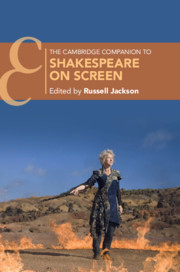Book contents
- The Cambridge Companion to Shakespeare on Screen
- Cambridge Companions to Literature
- The Cambridge Companion to Shakespeare on Screen
- Copyright page
- Contents
- Illustrations
- Contributors
- Preface
- Note on References
- Introduction
- Part I Adaptation and Its Contexts
- Part II Genres and Plays
- 5 The Comedies
- 6 The Environments of Tragedy on Screen: Hamlet, King Lear, Macbeth
- 7 Two Tragedies of Love: Romeo and Juliet and Othello
- 8 ‘Sad Stories of the Death of Kings’: The Hollow Crown and the Shakespearean History Play on Screen
- 9 The Roman Plays on Film
- 10 Screening Shakespearean Fantasy and Romance in A Midsummer Night’s Dream and The Tempest
- Part III Critical Issues
- Part IV Directors
- Further Reading
- Filmography
- Index
- Cambridge Companions To …
6 - The Environments of Tragedy on Screen: Hamlet, King Lear, Macbeth
from Part II - Genres and Plays
Published online by Cambridge University Press: 11 December 2020
- The Cambridge Companion to Shakespeare on Screen
- Cambridge Companions to Literature
- The Cambridge Companion to Shakespeare on Screen
- Copyright page
- Contents
- Illustrations
- Contributors
- Preface
- Note on References
- Introduction
- Part I Adaptation and Its Contexts
- Part II Genres and Plays
- 5 The Comedies
- 6 The Environments of Tragedy on Screen: Hamlet, King Lear, Macbeth
- 7 Two Tragedies of Love: Romeo and Juliet and Othello
- 8 ‘Sad Stories of the Death of Kings’: The Hollow Crown and the Shakespearean History Play on Screen
- 9 The Roman Plays on Film
- 10 Screening Shakespearean Fantasy and Romance in A Midsummer Night’s Dream and The Tempest
- Part III Critical Issues
- Part IV Directors
- Further Reading
- Filmography
- Index
- Cambridge Companions To …
Summary
This chapter considers the ways in which filmmakers have established the ‘tragic universe’ in screen adaptations of Hamlet, King Lear and Macbeth, through attention to the environment. Filmmakers repeatedly foreground the interplay between human body, physical surroundings and filmic space in ways that foreground the tragic environment as subjectively experienced and produced, and in turn see that environment producing and influencing its human subjects. The chapter moves between three kinds of tragic environment. The open spaces of films by Akira Kurosawa, Roman Polanski, Justin Kurzel, and Grigori Kozintsev frame human conflict within the natural world, a world that often suffers ecological catastrophe alongside its inhabitants, but which also endures. Another strand of films, including work by Michael Almereyda, Penny Woolcock, Don Boyd and Vishal Bhardwaj, establishes urban environments that privilege an interpretive focus on community, claustrophobia, consumption, and class. Finally, other filmmakers from Laurence Olivier to Kit Monkman, as well as directors of stage-to-screen adaptations, utilise cinematic technique to foreground inner psychological space, with environments constructed subjectively around their protagonists.
Information
- Type
- Chapter
- Information
- The Cambridge Companion to Shakespeare on Screen , pp. 79 - 91Publisher: Cambridge University PressPrint publication year: 2020
